Louise Christina Schattling.
‘A little German girl about ten years old … [left his service] because of the brutal treatment she received at the hands of her mistress, who was in the habit of beating her with a whip … [ she then] showed a large sore on her leg which she swore had been occasioned by the blow of a whip.’
This news item, from the 3 December 1864 edition of the North Australian, was of a court case held in Brisbane for non-payment of wages of 16s. 5d to a little 10 year old girl, Louise Schattling. She had been working for a family and alleged that she left because of the brutal treatment she received at the hands of her mistress. She wanted her outstanding wages, and the outcome of the case was that the family had to pay her. That little girl was my great grandmother.[1]
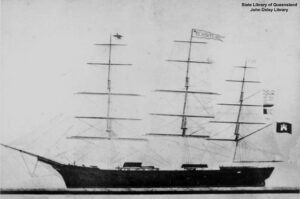
Beausite, a ship used to carry immigrants from Germany to Australia, ca. 1866. John Oxley Library, Brisbane, number: 3381.
Louise Christina Amy Schattling (Amy was often dropped in various records) was born in Heilbronn, Württemberg, Germany in 1854. Her father was Jacob Schattling, a cooper, and mother, Mary Fischer. Louise’s mother died and it appears Jacob remarried Lisette before the whole Schattling family, which included Carl (13), Julius (12), Heinrich (11) Louise (9) and Wilhelm (7), left Hamburg on the passenger ship The Beausite on 26 May 1863. Perhaps Mary and Jacob had planned to migrate before Mary died or arrangements to migrate may have been made after her death as soon as Jacob and Lisette married.
Many Germans chose to migrate at this time because of religious persecution at home, a desire to explore or a need for economic improvement. John Dunmore Lang, a prominent figure in Australia at the time, advocated strongly to bring German Protestants to Australia. Consequently, the first Queensland Government, which was formed after Queensland became a separate colony from NSW in 1859, set up a committee under Lang which sent an immigration agent to Germany. The agent promised free passage and other advantages to those Germans who came to Queensland.[2]
The Beausite took over three months to reach Brisbane going via Cornwall, down the west coast of Africa and arriving at the Cape of Good Hope on 26 July 1863. After experiencing ‘very heavy weather’, they reached the pilot station of Moreton Island on 4 September 1863 and the next day, the steamer, the Settler, collected the passengers and proceeded to the South Brisbane depot. The Courier announced that ‘the immigrants are a large number of skilled mechanics, and altogether are, we are informed a very fine class of people …’.[3]
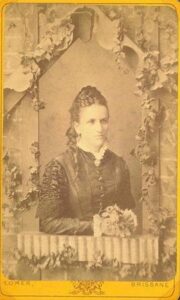
Louise Christina Schattling, ca early 1870s probably before she left Brisbane.
On arrival, many Germans travelled to German Station where there would be German speakers and they could receive advice. German Station had originally been set up as a mission by German Lutheran missionaries in 1838. The mission closed in 1848 and the area became German Station. The Schattlings probably went there after they left the ship as Louise’s father, Jacob, died there six years later in 1869.
By the time of his death, Jacob’s profession was a farmer. One of the advantages for Germans in migrating to Queensland was that each person, including women and children, could receive a land order from the government which entitled the holder to choose a certain amount of land (around 100 acres). Records show that each member of the Schattling family received a land order (which could also be sold) on 14 October 1863, a month after their arrival, and Jacob and four of his children (Julius had died by this date) received a subsequent land order on 9 September 1865. So the family were probably trying to farm their land.[4]
However, the family’s situation must have been very grim if Louise was working at the age of 10. Jacob died of tuberculosis (phthisis) which he may have had when he arrived and perhaps it was the reason the family moved to Queensland. His 1869 death certificate shows that he’d been diagnosed with TB in Queensland four years before his death, so perhaps his ill health meant that the whole family were trying to make a living.[5]
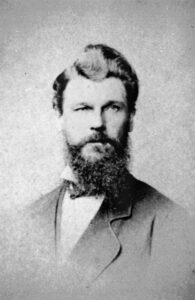
Harry Weedon Hardwicke, ca. early 1870s.
Louise was fifteen when her father died. She must have travelled to Townsville because she married Harry Weedon Hardwicke there on 20 January 1876. Harry had been born at Westbury, Tasmania in 1843 and probably moved to Townsville in the late 1860s or early 1870s, not long after Townsville was declared a town. He managed Dotswood and then Rockwood Stations, near Hughenden, in the early 1870s and was the first hotel keeper (he built the Hughenden Hotel) and storekeeper in Hughenden. It must have been a tough life for Louisa, although the family must have done well there because by the time my grandmother, Eva, was born 10 June 1886, the family were living a comfortable existence at ‘Dotswood’, Smith Street, Summer Hill, now Ashfield, in Sydney.
The Hardwicke family, Louise and Harry and their seven daughters Florence, Ruby, Ada, Queenie, Elsie, Gladys and my grandmother, Eva, returned to Queensland in the 1890s and settled on a lucerne and dairy farm called Vaucluse at Mount Walker, near Ipswich. Their son, Rawnsley Francis, lived there until he moved to Richmond in central Queensland where he died in 1902, aged 23. Their other son, William Rawnsley, had died in 1878 aged one, and my grandmother always told us that he had been accidentally dropped into the fireplace by the nanny!
The Hardwickes also had a residence in Newtown, Ipswich, and owned a store under the name L. Hardwicke & Co. It appears that entrepreneurial Louise (or Ma as my grandmother called her) had purchased the insolvent stock of a Mr Nosworthy in November 1899 and had set up her own milliner and draper store in Brisbane Street, Ipswich. She then sold the stock at bargain prices and continued to advertise her goods regularly in the Ipswich press.
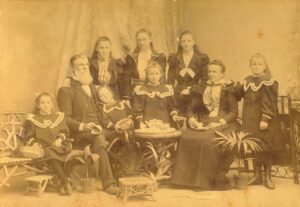
The Hardwicke Family.
However, Harry Hardwicke had not been doing so well. He had gone into partnership to set up a tourist venture, the Queensport Aquarium, on the Brisbane River behind Gibson Island. It was very badly damaged during the 1893 flood and Harry was declared insolvent in 1901. This was probably the reason that Louise advertised in July 1900 that a ‘winding-up sale is dancing along as merry as a cricket’. The advertisement stated that everything had to be sold by the end of the month as then ‘we hope to leave the colony’.
Did this refer to the Hardwicke family and were they thinking of leaving Queensland which was still a colony? However their farm was not sold until 1910 when they retired to Graceville, Brisbane. Harry died on 15 July 1923 and Louise lived to the ripe old age of 95, dying 20 June 1950.[6]
I have so many questions I could have asked Louise, but she died the same year that I was born. The only recollections I have are from my cousin, Kay McCarthy, who remembers her grandmother, Ada, recalling that Ma always called her husband ‘Mr Hardwicke’ and that as the mother of nine children, Louise never had her period after she got married. My sister, Diana, also remembers that our grandmother, Eva, recalled that Ma, as a German migrant, faced discrimination particularly from members of the extended Hardwicke family and during the First World War.
She must have been a tough woman to come from such difficult circumstances and live such a long life.
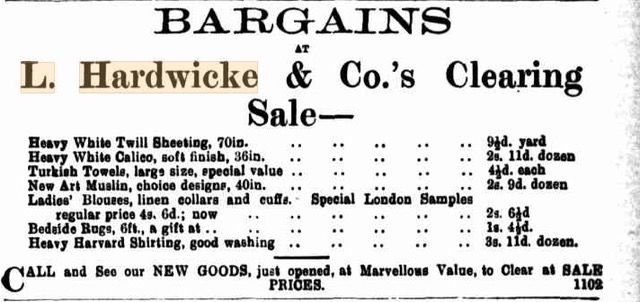
Advertising. Queensland Times, Ipswich Herald and General Advertiser (Qld. : 1861-1908), 28 November 1899, p. 3, col. 2.
[1] North Australian, (Brisbane Qld, 1863-1865), 3 December 1864, p.2, col. 7.
[2] Emigrants from Hamburg to Australia 1850-1879, compiled by Eric and Rosemary Kopittke, Brisbane Qld Family History Society, 1991.
[3] THE BEAUSITE. (1863, September 12). The Courier (Brisbane, Qld. : 1861 – 1864), p. 2. Retrieved July 13, 2023, from http://nla.gov.au/nla.news-article3165639
[4] Find My Past, Queensland Land Orders 1861-1874, Queensland State Archives.
[5] Overlack, P., German Settlers in the Moreton Bay Region 1838-1914 , presented to a meeting of the Society, 1983 https://www.textqueensland.com.au/item/article/43c54923310c731b13551ef9190d7ee7
[6] Queensland Times, 17 October 1901, p.12, Col. 2. http://nla.gov.au/nla.news-article122957672 Accessed 6 September 2018.

I very much enjoyed reading your story. Fancy whipping a small 10 year old girl! Incomprehensible! Do you know where German Farm was? I don’t have any German ancestors but I have observed a monument to German pioneer families and if my memory is right, it’s located somewhere near Mundubbera, a town not far from Eidsvold.
Editors note: Beverley, the place referred to was German Station, it was the original name of what we now know as Nundah, the cemetery there has many German burials.
Thanks Bev. There are still many unanswered questions about Louisa but aren’t there always!